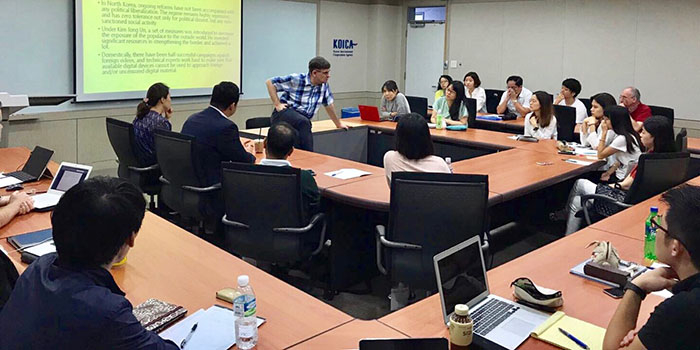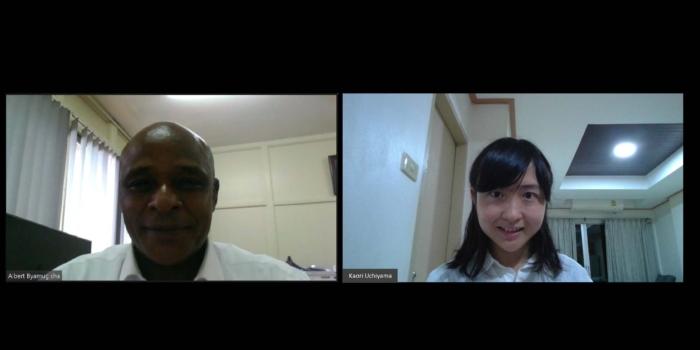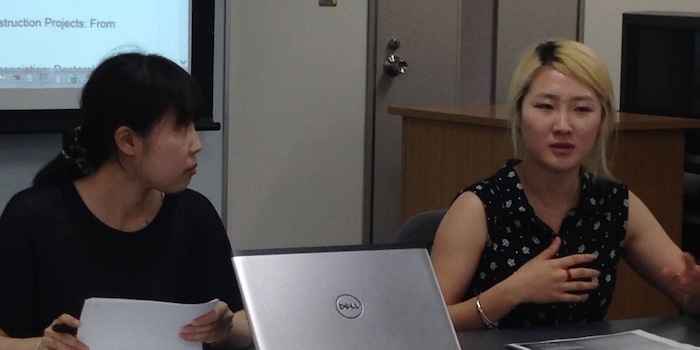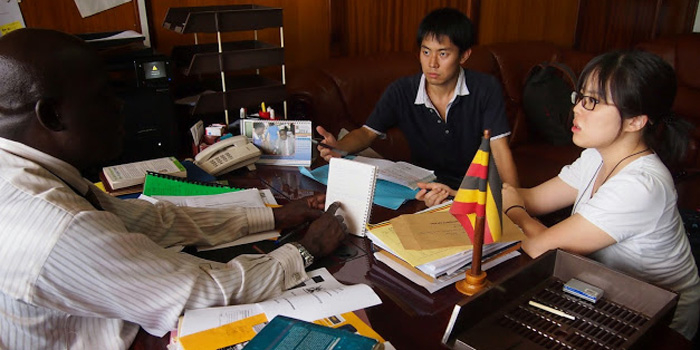The 2017 Campus Asia Summer Workshop on “Risk Management” was held in Korea University’s Graduate School of International Studies (GSIS), from August 10th to 18th, 2017. The workshop explored issues on “How to Manage North Korean Risks” from the perspective of South Korea, China, and Japan. Five Professors, specializing in different political and socio-economic issues in North Korea were invited to deliver lectures to twenty participants (graduate students) from Kobe University, Fudan University, and Korea University. From Ogawa seminar, four of the master students participated in this workshop and obtained a deeper understanding of the necessity to solve the North Korean nuclear challenge urgently and peacefully based on international cooperation among nations.
 This workshop also provided the participants with a valuable opportunity to visit the demilitarized zone (DMZ), which is a border barrier that divides the Korean Peninsula roughly in half. The DMZ serves as buffer zone between the Democratic People’s Republic of Korea (North Korea) and the Republic of Korea (South Korea). While in this buffer zone, the participants were fortunate to enjoy several historical and amazing sights shared by these two nations. One of the most impressive sights was that both North and South Korea maintain peaceful villages in each other’s side of the DMZ. Moreover, using telescopes in the observatory on South Korea’s side, the participants were able to observe the natural landscapes, buildings under constructions, as well as people’s daily living conditions in North Korea. The participants could clearly hear the passionate and merry music from North Korea. At that brief moment, it seemed that these two countries have never been separated; the two sets of people can understand each other well and could be closely linked in a unified Korea.
This workshop also provided the participants with a valuable opportunity to visit the demilitarized zone (DMZ), which is a border barrier that divides the Korean Peninsula roughly in half. The DMZ serves as buffer zone between the Democratic People’s Republic of Korea (North Korea) and the Republic of Korea (South Korea). While in this buffer zone, the participants were fortunate to enjoy several historical and amazing sights shared by these two nations. One of the most impressive sights was that both North and South Korea maintain peaceful villages in each other’s side of the DMZ. Moreover, using telescopes in the observatory on South Korea’s side, the participants were able to observe the natural landscapes, buildings under constructions, as well as people’s daily living conditions in North Korea. The participants could clearly hear the passionate and merry music from North Korea. At that brief moment, it seemed that these two countries have never been separated; the two sets of people can understand each other well and could be closely linked in a unified Korea.
As one of the participants, I was extremely honored to be able to participate in this summer workshop. Owing to this opportunity, I acquired valuable knowledge from the invited professors, which helped me to recognize and appreciate the importance of international relations, and international cooperation. Moreover, I communicated with many participants from different countries, which not only gave me constructive viewpoints from other participants, but also enabled me to build friendships with them. Furthermore, it was my first time to come into contact with the topic/ area of the international relations, and now I hold a strong view that politics and peace are not only the responsibility of the government, but also the obligation of every citizen. Faced with international development challenges, cooperation between countries is the best solution to tackle them, thus helping maintain peace in the world.

It was an excellent opportunity for all the participants to attend the Campus Asia Summer Workshop held at Korea University. I sincerely appreciate the kind support received from the Dean & Professor Sung-Han Kim, and Professor Jung-Sun Han at Korea University, and everyone who contributed in this workshop from Campus Asia Office at Kobe University. Finally, I would like to express my deepest gratitude to my academic advisor, Professor Keiichi Ogawa at Kobe University, who highly encouraged us to participate in this workshop.
The followings are the names of the lecturers and their presentation topics in this workshop listed in the alphabetical order.
- Dr. Andrei Lankove (Professor, Kookmin University) “Assessment of the Kim Jong-un Regime of North Korea”
- Dr. Choi Kang (Vice President, Asian Institute for Policy Studies) “Strategic Risks in Coping with the North Korean Nuclear Problem”
- Dr. Han Sukhee (Professor, Yonsei University) “North Korea: A Strategic Asset or Liability for China?”
- Dr. Kim Sung-hang (Dean & Professor, Korea University) “Risks and Opportunities of Korean Unification”
- Dr. Shin Beom-chui (Professor, Korea National Diplomatic Academy) “What if North Korea Collapses?”
Authored by Kexin Wang (Master’s Student)
Related links
Korea University’s Graduate School of International Studies (GSIS)
Related


 This workshop also provided the participants with a valuable opportunity to visit the demilitarized zone (DMZ), which is a border barrier that divides the Korean Peninsula roughly in half. The DMZ serves as buffer zone between the Democratic People’s Republic of Korea (North Korea) and the Republic of Korea (South Korea). While in this buffer zone, the participants were fortunate to enjoy several historical and amazing sights shared by these two nations. One of the most impressive sights was that both North and South Korea maintain peaceful villages in each other’s side of the DMZ. Moreover, using telescopes in the observatory on South Korea’s side, the participants were able to observe the natural landscapes, buildings under constructions, as well as people’s daily living conditions in North Korea. The participants could clearly hear the passionate and merry music from North Korea. At that brief moment, it seemed that these two countries have never been separated; the two sets of people can understand each other well and could be closely linked in a unified Korea.
This workshop also provided the participants with a valuable opportunity to visit the demilitarized zone (DMZ), which is a border barrier that divides the Korean Peninsula roughly in half. The DMZ serves as buffer zone between the Democratic People’s Republic of Korea (North Korea) and the Republic of Korea (South Korea). While in this buffer zone, the participants were fortunate to enjoy several historical and amazing sights shared by these two nations. One of the most impressive sights was that both North and South Korea maintain peaceful villages in each other’s side of the DMZ. Moreover, using telescopes in the observatory on South Korea’s side, the participants were able to observe the natural landscapes, buildings under constructions, as well as people’s daily living conditions in North Korea. The participants could clearly hear the passionate and merry music from North Korea. At that brief moment, it seemed that these two countries have never been separated; the two sets of people can understand each other well and could be closely linked in a unified Korea.




